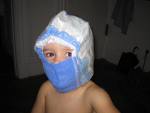The Salt Lake County Health Department has determined that a food item served at a dining hall was likely the cause of illnesses that sent nearly 60 people who are homeless to hospitals in Salt Lake City Sunday night.
 According to a press release from the Salt Lake County Health Department, investigators determined that soup served at St. Vincent de Paul Dining Hall contained Staphylococcal enterotoxin, which is a common cause of foodborne illness when the bacteria is introduced to improperly heated or cooled food. The bacteria is found on human skin.
According to a press release from the Salt Lake County Health Department, investigators determined that soup served at St. Vincent de Paul Dining Hall contained Staphylococcal enterotoxin, which is a common cause of foodborne illness when the bacteria is introduced to improperly heated or cooled food. The bacteria is found on human skin.
“I felt like my stomach was going to actually explode — it felt like my intestines were going to explode. I started vomiting before the paramedics got there,” Mark Hofheins told FOX 13 News earlier this week.
The release states St. Vincent de Paul Dining Hall has cooperated fully with the department and that investigators began observing kitchen operations Monday to ensure kitchen workers were following health regulations.
Officials stated the kitchen undergoes surprise inspections twice each year and has “consistently done well” in those.
“This incident at St. Vincent de Paul Dining Hall appears to be an isolated food handling error,” said Andrea Gamble, SLCHD environmental health scientist. “Unfortunately, a single lapse in temperature controls or food-contact protocols can cause problems.”
Health Department officials said a dining hall must follow the same rules for food service as a restaurant, and as such volunteers who do not have a food handler’s permit can only serve food that has already been prepared by those at the dining hall who do have the necessary permits.


